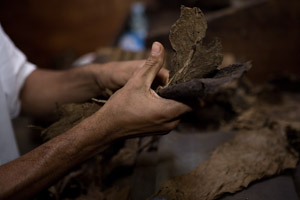In an attempt to reinvent itself as a “responsible corporate citizen,” tobacco company Philip Morris has begun an unlikely support of regulation of tobacco products by the U.S. Food and Drug Administration.

However, a new study by Peter Benson, Ph.D., assistant professor of anthropology in Arts & Sciences, published in the latest issue of “American Ethnologist,” shows that proposed FDA regulation fails to address the suffering of migrant tobacco workers, the prevalence of smoking and the redistribution of leaf production to the developing world.
Benson suggests the FDA may actually favor the tobacco industry by reducing its liability for tobacco-related death and disease, by sustaining its operations around the world and by strengthening its control over the terms of its contracts with U.S. tobacco growers.
Benson’s study is based on fieldwork conducted in North Carolina. He provides an ethnographic view of how the recent shift from traditional auction marketing to private contract agriculture affects differently positioned farmers and farm workers.
While the company’s support for FDA regulation of tobacco products seems calculated to enhance its public image, limit its liability, and maintain its global operations, it will also contribute to the continued restructuring of North Carolina’s agriculture toward large-scale farming and dependency on undocumented immigrant labor from Mexico and Central America.
“In North Carolina, this historic tobacco control measure and cornerstone of Philip Morris’s corporate makeover risks shifting the financial, moral, and political burdens of health-driven production onto the shoulders of insecure farmers and subordinated farm workers,” Benson concludes.